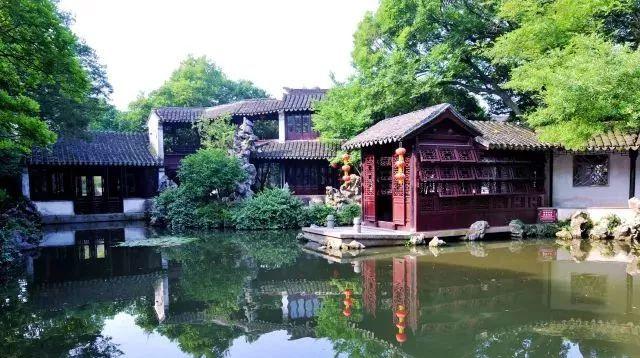
Yangzhou garden is an important carrier of Yangzhou art, technology and scholarship, and its relationship with Yangzhou classical architecture, flowers and trees bonsai, Yangzhou calligraphy and painting, Yangzhou cuisine, Yangzhou opera, etc. are very close. Yangzhou's famous gardens were mostly built by officials and eunuchs, and the way of life they advocated soon became a social trend and fashion.
First of all, food, in the Sui Dynasty, the chef Xie Xie, who has been following Yang Guang, summed up his experience in Yangzhou and wrote a food book "Food Classic"; during the Northern Song Dynasty, Su Dongpo was a Taishou in Yangzhou, and in the poem, he recorded that he had given many "Yangzhou native things" such as fresh crucian carp, purple crab, lettuce, ginger sprouts and so on to his friend Qin Shaoyou. In the Ming and Qing dynasties, the cooking methods popular in Yangzhou were gradually fixed and developed into Huaiyang cuisine, which was on a par with Beijing cuisine, Sichuan cuisine and Cantonese cuisine, becoming one of the four major cuisines in China.
During the Qianlong Period of the Qing Dynasty, there were all kinds of painting boats and boats on the Slender West Lake in Yangzhou, and there were more than 200 song boats, flower boats, bird boats, lamp boats, wine boats and so on every day. This wine boat is naturally the boat that operates the wine banquet on the lake. The "Yangzhou Painting Ship Record" records that the painting ship is in the front, and the wine boat is in the back,...... There is a sound of food, and cooking smoke is gradually rising.
During the Qianlong period of the Qing Dynasty, two books came out, one was Yuan Ming, a famous scholar who lived in Yangzhou garden for a long time, who wrote the "Food List with the Garden", and the other was the salt merchant Tong Yuexian, who owned a private garden, who wrote the "Tuning Ding Collection". The latter is a direct example of huaiyang cuisine being born in yangzhou gardens. The writer Cao Juren wrote in the article: "The eating of Yangzhou is cultivated for salt merchants. Almost every salt merchant in Yangzhou has a first-class chef, and there is a famous dish or dim sum. The salt merchant invited guests, went to each house to borrow cooks, each cook, made a dish, and put together a whole table. "On the one hand, because Yangzhou has rich food resources, on the other hand, when salt merchants competed for luxury food during the Southern Tour of Kangqian, coupled with the technical exchanges between professional chefs and home cooks, Huaiyang cuisine was quickly popular in the north and south of the river.
The Qianlong Emperor favored Huaiyang cuisine, and when he toured the south, he accompanied the Yangzhou chef with him, and finally, a group of chefs accompanied him into Beijing, and achieved the basic recipe of the Manchu han feast. Looking at the Manchu meal list recorded in the "Yangzhou Painting Record" today, it is almost indistinguishable from the record of the imperial meal archives that have just been declassified in recent years.
In Yangzhou He Garden, the first garden of the late Qing Dynasty, there is the only water stage in a classical Chinese garden- the Water Center Pavilion. It has witnessed many glorious moments when Chinese opera flourished in the gardens of Yangzhou.
After the Tang Dynasty, Yangzhou's garden pavilion flourished and opera flourished. Sheng Tang, "Yang Yi Yi Yi Er", means that Yangzhou is the first prosperous place in the country, and Yizhou (Chengdu) is the second most prosperous place in the country. After the Ming and Qing dynasties, the salt industry was monopolized by the government, and Yangzhou became the richest place in the world, "orchestrating 100,000 households, night and night noisy", the Yangzhou salt merchants who were obsessed with the art of opera were even more willing to invest, they raised a lot of drama classes in their private gardens, more than a hundred people, in addition to food and drink, but also write plays, rehearsals, degrees of music, tailoring, setting up stages, setting up scenes... At the most prosperous time, yangzhou's gardens have "more than 20 trees in the watching building and more than 10 trees in the song platform", and between the water pavilion halls, the opera is flourishing.
In Yangzhou, there is a very good tradition, that is, whether it is the officials and the people, whether they are noble, they like to watch plays and listen to music, the emperor toured the south, and the salt merchants built one after another in the public gardens along the Slender West Lake, and sang endlessly, such benefits, even the people enjoyed it. In the middle of the Qing Dynasty, Yangzhou emerged a number of famous salt merchant family drama classes, there are Chuntai, Deyin, Baifu, Huang Ban, Zhang Ban, etc., Qianlong fifty-five years (1790), the emperor let the famous opera classes from all over the country into Beijing to perform birthdays, the first name is Yangzhou's "Sanqing Class". Since then, the Sixi, Hechun, and Chuntai classes have successively set out from Yangzhou to enter Beijing, historically known as the "Four Great Emblem Classes Entering Beijing", and the Four Great Emblem Classes have been active in Beijing for a hundred years and have gradually evolved into Peking Opera - so it is recognized in the historical circles that today's Peking Opera, which is the essence of the country, has evolved from the development of local opera in Yangzhou.
◎ This article was originally published in "Guangming Daily", the source network, the copyright of the picture and text belongs to the original author, if there is infringement, please contact to delete.